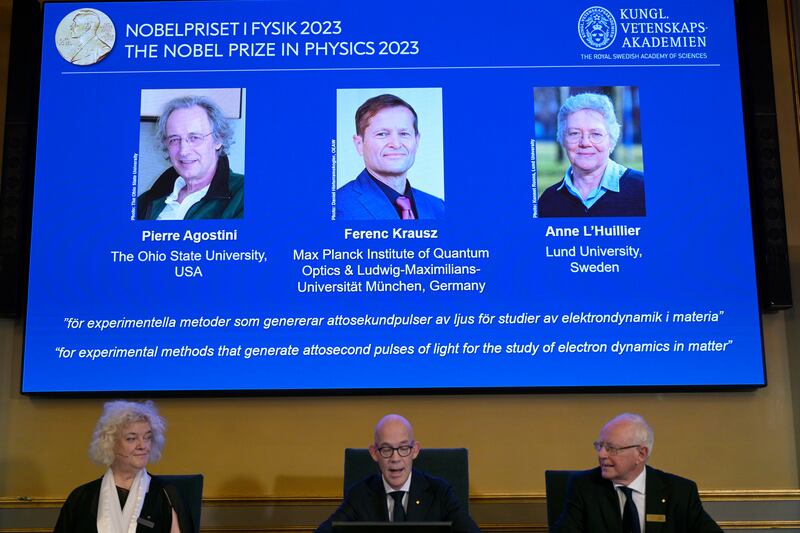The Nobel Prize in Physics has been awarded to three scientists who have been studying electrons in atoms during the tiniest of split seconds.
Pierre Agostini, of The Ohio State University in the US, Ferenc Krausz, of the Max Planck Institute of Quantum Optics and Ludwig Maximilian University of Munich in Germany, and Anne L’Huillier, of Lund University in Sweden, have jointly won the award.
Hans Ellegren, secretary general of the Royal Swedish Academy of Sciences, announced the winners on Tuesday in Stockholm.
The scientists' pioneering work concerned electrons in flashes of light.
"The 2023 physics laureate Pierre Agostini succeeded in producing and investigating a series of consecutive light pulses, in which each pulse lasted just 250 attoseconds," the judges said.
"At the same time, his 2023 co-laureate Ferenc Krausz was working with another type of experiment, one that made it possible to isolate a single light pulse that lasted 650 attoseconds.
"Anne L’Huillier discovered that many different overtones of light arose when she transmitted infrared laser light through a noble gas.
"Each overtone is a light wave with a given number of cycles for each cycle in the laser light. They are caused by the laser light interacting with atoms in the gas; it gives some electrons extra energy that is then emitted as light. Ms L’Huillier has continued to explore this phenomenon, laying the ground for subsequent breakthroughs."
The judges said their work will eventually lead to better electronics and disease diagnosis.
Ms L’Huillier is only the fifth woman to win a Nobel in Physics and was lecturing to students when she heard the news.
"It is just fantastic," she said.
"I was teaching when the call came, the last half of my lecture was difficult!
"This is a prestigious prize, as you know there are not so many women so this is very special."
Their experiments “have given humanity new tools for exploring the world of electrons inside atoms and molecules,” according to the judges at the Royal Swedish Academy of Sciences.
They “have demonstrated a way to create extremely short pulses of light that can be used to measure the rapid processes in which electrons move or change energy.”
“We can now open the door to the world of electrons. Attosecond physics gives us the opportunity to understand mechanisms that are governed by electrons. The next step will be utilising them,” Eva Olsson, Chair of the Nobel Committee for Physics, said on Tuesday.
"There are potential applications in many different areas. In electronics, for example, it is important to understand and control how electrons behave in a material. Attosecond pulses can also be used to identify different molecules, such as in medical diagnostics," the judges added.
The 10 most recent Nobel Physics Prize winners were:
2022: Alain Aspect (France), John Clauser (US) and Anton Zeilinger (Austria) for groundbreaking work in the field of quantum mechanics.
2021: Syukuro Manabe (US-Japan) and Klaus Hasselmann (Germany) for climate models, and Giorgio Parisi (Italy) for work on the theory of disordered materials and random processes.
2020: Roger Penrose (Britain), Reinhard Genzel (Germany) and Andrea Ghez (US) for their research into black holes.
2019: James Peebles (Canada-US) for discoveries explaining the universe's evolution after the Big Bang, and Michel Mayor and Didier Queloz (Switzerland) for the first discovery of an exoplanet.
2018: Arthur Ashkin (US), Gerard Mourou (France) and Donna Strickland (Canada) for inventions in the laser field used for advanced precision instruments in corrective eye surgery and industry.
2017: Barry Barish, Kip Thorne and Rainer Weiss (US) for the discovery of gravitational waves, a phenomenon predicted by Albert Einstein a century ago as part of his theory of general relativity.
2016: David Thouless, Duncan Haldane and Michael Kosterlitz (Britain) for their study of strange phenomena in unusual phases, or states, of matter, such as superconductors, superfluids or thin magnetic films.
2015: Takaaki Kajita (Japan) and Arthur McDonald (Canada) for their work on neutrinos.
2014: Isamu Akasaki (Japan), Hiroshi Amano (Japan) and Shuji Nakamura (US) for their work on LED lamps.
2013: Peter Higgs (Britain) and Francois Englert (Belgium) for their work on the so-called Higgs boson, a subatomic particle that gives mass to other particles.
The prize is the second Nobel of the season after the Medicine or Physiology Prize on Monday, which went to mRNA researchers Katalin Kariko and Drew Weissman for their groundbreaking technology that paved the way for messenger RNA, or mRNA, Covid-19 vaccines.
The Physics Prize will be followed by the Chemistry Prize on Wednesday, with the highly watched Literature and Peace Prizes to be announced on Thursday and Friday, respectively.
The Economics Prize – created in 1968 and the only Nobel not included in the 1895 will of Swedish inventor and philanthropist Alfred Nobel, who founded the awards – will bring this year's awards season to a close on Monday.







